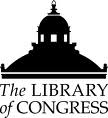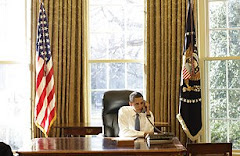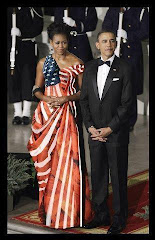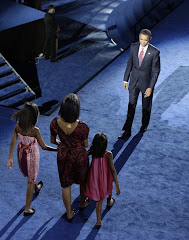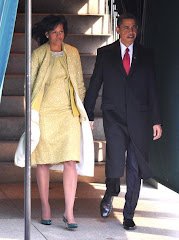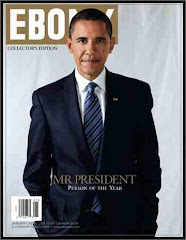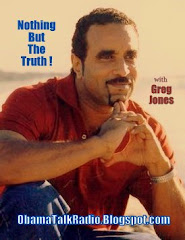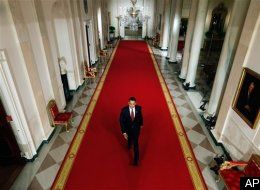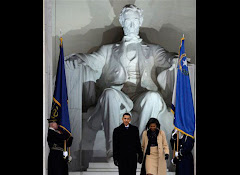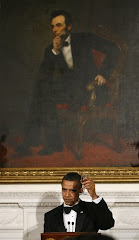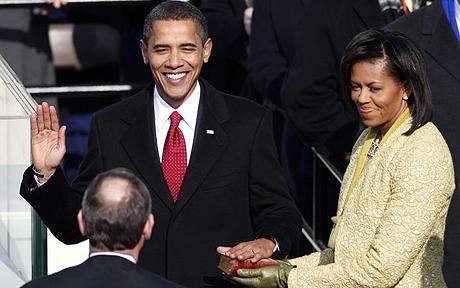Gov. of Illinois Caught Trying
To Sell Obama's Senate Seat
Read: FBI/U.S. Attorney Release
(From U.S. Attorney Office)
Illinois Gov. Rod R. Blagojevich and his Chief of Staff, John Harris, were arrested today by FBI agents on federal corruption charges alleging that they and others are engaging in ongoing criminal activity: conspiring to obtain personal financial benefits for Blagojevich by leveraging his sole authority to appoint a United States Senator; threatening to withhold substantial state assistance to the Tribune Company in connection with the sale of Wrigley Field to induce the firing of Chicago Tribune editorial board members sharply critical of Blagojevich; and to obtain campaign contributions in exchange for official actions - both historically and now in a push before a new state ethics law takes effect January 1, 2009.
Blagojevich, 51, and Harris, 46, both of Chicago, were each charged with conspiracy to commit mail and wire fraud and solicitation of bribery. They were charged in a two-count criminal complaint that was sworn out on Sunday and unsealed today following their arrests, which occurred without incident, announced Patrick J. Fitzgerald, United States Attorney for the Northern District of Illinois, and Robert D. Grant, Special Agent-in-Charge of the Chicago Office of the Federal Bureau of Investigation. Both men were expected to appear later today before U.S. Magistrate Judge Nan Nolan in U.S. District Court in Chicago.
A 76-page FBI affidavit alleges that Blagojevich was intercepted on court-authorized wiretaps during the last month conspiring to sell or trade Illinois' U.S. Senate seat vacated by President-elect Barack Obama for financial and other personal benefits for himself and his wife. At various times, in exchange for the Senate appointment, Blagojevich discussed obtaining:
A substantial salary for himself at a either a non-profit foundation or an organization affiliated with labor unions;
Placing his wife on paid corporate boards where he speculated she might garner as much as $150,000 a year;
Promises of campaign funds - including cash up front; and
A cabinet post or ambassadorship for himself.
Just last week, on December 4, Blagojevich allegedly told an advisor that he might "get some (money) up front, maybe" from Senate Candidate 5, if he named Senate Candidate 5 to the Senate seat, to insure that Senate Candidate 5 kept a promise about raising money for Blagojevich if he ran for re-election. In a recorded conversation on October 31, Blagojevich claimed he was approached by an associate of Senate Candidate 5 as follows: "We were approached 'pay to play.' That, you know, he'd raise 500 grand. An emissary came. Then the other guy would raise a million, if I made him (Senate Candidate 5) a Senator."
On November 7, while talking on the phone about the Senate seat with Harris and an advisor, Blagojevich said he needed to consider his family and that he is "financially" hurting, the affidavit states. Harris allegedly said that they were considering what would help the "financial security" of the Blagojevich family and what will keep Blagojevich "politically viable." Blagojevich stated, "I want to make money," adding later that he is interested in making $250,000 to $300,000 a year, the complaint alleges.
On November 10, in a lengthy telephone call with numerous advisors that included discussion about Blagojevich obtaining a lucrative job with a union-affiliated organization in exchange for appointing a particular Senate Candidate whom he believed was favored by the President-elect and which is described in more detail below, Blagojevich and others discussed various ways Blagojevich could "monetize" the relationships he has made as governor to make money after leaving that office.
"The breadth of corruption laid out in these charges is staggering," Mr. Fitzgerald said. "They allege that Blagojevich put a 'for sale' sign on the naming of a United States Senator; involved himself personally in pay-to-play schemes with the urgency of a salesman meeting his annual sales target; and corruptly used his office in an effort to trample editorial voices of criticism. The citizens of Illinois deserve public officials who act solely in the public's interest, without putting a price tag on government appointments, contracts and decisions," he added.
Mr. Grant said: "Many, including myself, thought that the recent conviction of a former governor would usher in a new era of honesty and reform in Illinois politics. Clearly, the charges announced today reveal that the office of the Governor has become nothing more than a vehicle for self-enrichment, unrestricted by party affiliation and taking Illinois politics to a new low."
Mr. Fitzgerald and Mr. Grant thanked the Chicago offices of the Internal Revenue Service Criminal Investigation Division, the U.S. Postal Inspection Service and the U.S. Department of Labor Office of Inspector General for assisting in the ongoing investigation. The probe is part of Operation Board Games, a five-year-old public corruption investigation of pay-to-play schemes, including insider-dealing, influence-peddling and kickbacks involving private interests and public duties.
Federal agents today also executed search warrants at the offices of Friends of Blagojevich located at 4147 North Ravenswood, Suite 300.
Pay-to-Play Schemes:
The charges include historical allegations that Blagojevich and Harris schemed with others - including previously convicted defendants Antoin Rezko, Stuart Levine, Ali Ata and others - since becoming governor in 2002 to obtain and attempt to obtain financial benefits for himself, his family and third parties, including his campaign committee, Friends of Blagojevich, in exchange for appointments to state boards and commissions, state employment, state contracts and access to state funds. A portion of the affidavit recounts the testimony of various witnesses at Rezko's trial earlier this year.
The charges focus, however, on events since October when the Government obtained information that Blagojevich and Fundraiser A, who is chairman of Friends of Blagojevich, were accelerating Blagojevich's allegedly corrupt fund-raising activities to accumulate as much money as possible this year before a new state ethics law would severely curtail Blagojevich's ability to raise money from individuals and entities that have existing contracts worth more than $50,000 with the State of Illinois. Agents learned that Blagojevich was seeking approximately $2.5 million in campaign contributions by the end of the year, principally from or through individuals or entities - many of which have received state contacts or appointments - identified on a list maintained by Friends of Blagojevich, which the FBI has obtained.
The affidavit details multiple incidents involving efforts by Blagojevich to obtain campaign contributions in connection with his official actions as governor, including these three in early October:
* After an October 6 meeting with Harris and Individuals A and B, during which Individual B sought state help with a business venture, Blagojevich told Individual A to approach Individual B about raising $100,000 for Friends of Blagojevich this year. Individual A said he later learned that Blagojevich reached out directly to Individual B to ask about holding a fund-raiser;
* Also on October 6, Blagojevich told Individual A that he expected Highway Contractor 1 to raise $500,000 in contributions and that he was willing to commit additional state money to a Tollway project - beyond $1.8 billion that Blagojevich announced on October15 - but was waiting to see how much money the contractor raised for Friends of Blagojevich; and
* On October 8, Blagojevich told Individual A that he wanted to obtain a $50,000 contribution from Hospital Executive 1, the chief executive officer of Children's Memorial Hospital in Chicago, which had recently received a commitment of $8 million in state funds. When the contribution was not forthcoming, Blagojevich discussed with Deputy Governor A the feasibility of rescinding the funding.
On October 21, the Government obtained a court order authorizing the interception of conversations in both a personal office and a conference room used by Blagojevich at the offices of Friends of Blagojevich. The FBI began intercepting conversations in those rooms on the morning of October 22. A second court order was obtained last month allowing those interceptions to continue. On October 29, a court order was signed authorizing the interception of conversations on a hardline telephone used by Blagojevich at his home. That wiretap was extended for 30 days on November 26, according to the affidavit.
Another alleged example of a pay-to-play scheme was captured in separate telephone conversations that Blagojevich had with Fundraiser A on November 13 and Lobbyist 1 on December 3. Lobbyist 1 was reporting to Blagojevich about his efforts to collect a contribution from Contributor 1 and related that he "got in his face" to make it clear to Contributor 1 that a commitment to make a campaign contribution had to be done now, before there could be some skittishness over the timing of the contribution and Blagojevich signing a bill that would benefit Contributor 1. Blagojevich commented to Lobbyist 1 "good" and "good job." The bill in question, which is awaiting Blagojevich 's signature, is believed to be legislation that directs a percentage of casino revenue to the horse racing industry.
Sale of U.S. Senate Appointment:
Regarding the Senate seat, the charges allege that Blagojevich, Harris and others have engaged and are engaging in efforts to obtain personal gain, including financial gain, to benefit Blagojevich and his family through corruptly using Blagojevich's sole authority to appoint a successor to the unexpired term of the President-elect's former Senate seat, which he resigned effective November 16. The affidavit details numerous conversations about the Senate seat between November 3 and December 5. In these conversations, Blagojevich repeatedly discussed the attributes of potential candidates, including their abilities to benefit the people of Illinois, and the financial and political benefits he and his wife could receive if he appointed various of the possible candidates.
Throughout the intercepted conversations, Blagojevich also allegedly spent significant time weighing the option of appointing himself to the open Senate seat and expressed a variety of reasons for doing so, including: frustration at being "stuck" as governor; a belief that he will be able to obtain greater resources if he is indicted as a sitting Senator as opposed to a sitting governor; a desire to remake his image in consideration of a possible run for President in 2016; avoiding impeachment by the Illinois legislature; making corporate contacts that would be of value to him after leaving public office; facilitating his wife's employment as a lobbyist; and generating speaking fees should he decide to leave public office.
In the earliest intercepted conversation about the Senate seat described in the affidavit, Blagojevich told Deputy Governor A on November 3 that if he is not going to get anything of value for the open seat, then he will take it for himself: "if . . . they're not going to offer anything of any value, then I might just take it." Later that day, speaking to Advisor A, Blagojevich said: "I'm going to keep this Senate option for me a real possibility, you know, and therefore I can drive a hard bargain." He added later that the seat "is a [expletive] valuable thing, you just don't give it away for nothing."
Over the next couple of days - Election Day and the day after - Blagojevich was captured discussing with Deputy Governor A whether he could obtain a cabinet position, such as Secretary of Health and Human Services or the Department of Energy or various ambassadorships. In a conversation with Harris on November 4, Blagojevich analogized his situation to that of a sports agent shopping a potential free agent to the highest bidder. The day after the election, Harris allegedly suggested to Blagojevich that the President-elect could make him the head of a private foundation.
Later on November 5, Blagojevich said to Advisor A, "I've got this thing and it's [expletive] golden, and, uh, uh, I'm just not giving it up for [expletive] nothing. I'm not gonna do it. And, and I can always use it. I can parachute me there," the affidavit states.
Two days later, in a three-way call with Harris and Advisor B, a consultant in Washington, Blagojevich and the others allegedly discussed the prospect of a three-way deal for the Senate appointment involving an organization called "Change to Win," which is affiliated with various unions including the Service Employees International Union (SEIU).
On November 10, Blagojevich, his wife, Harris, Governor General Counsel, Advisor B and other Washington-based advisors participated at different times in a two-hour phone call in which they allegedly discussed, among other things, a deal involving the SEIU. Harris said they could work out a deal with the union and the President-elect where SEIU could help the President-elect with Blagojevich's appointment of Senate Candidate 1, while Blagojevich would obtain a position as the National Director of the Change to Win campaign and SEIU would get something favorable from the President-elect in the future. Also during that call, Blagojevich agreed it was unlikely that the President-elect would name him Secretary of Health and Human Services or give him an ambassadorship because of all of the negative publicity surrounding him.
In a conversation with Harris on November 11, the charges state, Blagojevich said he knew that the President-elect wanted Senate Candidate 1 for the open seat but "they're not willing to give me anything except appreciation. [Expletive] them." Earlier in that conversation, Blagojevich suggested starting a 501(c)(4) non-profit organization, which he could head and engage in political activity and lobbying. In that conversation with Harris and other discussions with him and others over the next couple of days, Blagojevich suggested by name several well-known, wealthy individuals who could be prevailed upon to seed such an organization with $10-$15 million, and suggesting that he could take the organization's reins when he is no longer governor, according to the affidavit.
On November 12, Blagojevich spoke with SEIU Official who was in Washington. This conversation occurred about a week after Blagojevich had met with SEIU Official to discuss the Senate seat, with the understanding that the union official was an emissary to discuss Senate Candidate 1's interest in the Senate seat. During the November 12 conversation, Blagojevich allegedly explained the non-profit organization idea to SEIU Official and said that it could help Senate Candidate 1. The union official agreed to "put that flag up and see where it goes," although the official also had said he wasn't certain if Senate Candidate 1 wanted the official to keep pushing her candidacy. Senate Candidate 1 eventually removed herself from consideration for the open seat.
Also on November 12, in a conversation with Harris, the complaint affidavit states that Blagojevich said his decision about the open Senate seat will be based on three criteria in the following order of importance: "our legal situation, our personal situation, my political situation. This decision, like every other one, needs to be based upon that. Legal. Personal. Political." Harris said: "legal is the hardest one to satisfy." Blagojevich said that his legal problems could be solved by naming himself to the Senate seat.
As recently as December 4, in separate conversations with Advisor B and Fundraiser A, Blagojevich said that he was "elevating" Senate Candidate 5 on the list of candidates because, among other reasons, if Blagojevich ran for re-election, Senate Candidate 5 would "raise[] money" for him. Blagojevich said that he might be able to cut a deal with Senate Candidate 5 that provided Blagojevich with something "tangible up front." Noting that he was going to meet with Senate Candidate 5 in the next few days, Blagojevich told Fundraiser A to reach out to an intermediary (Individual D), from whom Blagojevich is attempting to obtain campaign contributions and who Blagojevich believes is close to Senate Candidate 5. Blagojevich told Fundraiser A to tell Individual D that Senate Candidate 5 was a very realistic candidate but Blagojevich was getting a lot of pressure not to appoint Senate Candidate 5, according to the affidavit.
Blagojevich allegedly told Fundraiser A to tell Individual D that if Senate Candidate 5 is going to be chosen, "some of this stuff's gotta start happening now . . . right now . . . and we gotta see it." Blagojevich continued, "You gotta be careful how you express that and assume everybody's listening, the whole world is listening. You hear me?" Blagojevich further directed Fundraiser A to talk to Individual D in person, not by phone, and to communicate the "urgency" of the situation.
Blagojevich spoke to Fundraiser A again the next day, December 5, and discussed that day's Chicago Tribune front page article stating that Blagojevich had recently been surreptitiously recorded as part of the ongoing criminal investigation. Blagojevich instructed Fundraiser A to "undo your [Individual D] thing," and Fundraiser A confirmed it would be undone, the complaint alleges.
Also on December 5, Blagojevich and three others allegedly discussed whether to move money out of the Friends of Blagojevich campaign fund to avoid having the money frozen by federal authorities and also considered the possibility of prepaying the money to Blagojevich's criminal defense attorney with an understanding that the attorney would donate the money back at a later time if it was not needed. They also discussed opening a new fund raising account named Citizens for Blagojevich with new contributions.
Misuse of State Funding To Induce Firing of Chicago Tribune Editorial Writers:
According to the affidavit, intercepted phone calls revealed that the Tribune Company, which owns the Chicago Tribune and the Chicago Cubs, has explored the possibility of obtaining assistance from the Illinois Finance Authority (IFA) relating to the Tribune Company's efforts to sell the Cubs and the financing or sale of Wrigley Field. In a November 6 phone call, Harris explained to Blagojevich that the deal the Tribune Company was trying to get through the IFA was basically a tax mitigation scheme in which the IFA would own title to Wrigley Field and the Tribune would not have to pay capital gains tax, which Harris estimated would save the company approximately $100 million.
Intercepted calls allegedly show that Blagojevich directed Harris to inform Tribune Owner and an associate, identified as Tribune Financial Advisor, that state financial assistance would be withheld unless members of the Chicago Tribune's editorial board were fired, primarily because Blagojevich viewed them as driving discussion of his possible impeachment. In a November 4 phone call, Blagojevich allegedly told Harris that he should say to Tribune Financial Advisor, Cubs Chairman and Tribune Owner, "our recommendation is fire all those [expletive] people, get 'em the [expletive] out of there and get us some editorial support."
On November 6, the day of a Tribune editorial critical of Blagojevich , Harris told Blagojevich that he told Tribune Financial Advisor the previous day that things "look like they could move ahead fine but, you know, there is a risk that all of this is going to get derailed by your own editorial page." Harris also told Blagojevich that he was meeting with Tribune Financial Advisor on November 10.
In a November 11 intercepted call, Harris allegedly told Blagojevich that Tribune Financial Advisor talked to Tribune Owner and Tribune Owner "got the message and is very sensitive to the issue." Harris told Blagojevich that according to Tribune Financial Advisor, there would be "certain corporate reorganizations and budget cuts coming and, reading between the lines, he's going after that section." Blagojevich allegedly responded. "Oh. That's fantastic." After further discussion, Blagojevich said, "Wow. Okay, keep our fingers crossed. You're the man. Good job, John."
In a further conversation on November 21, Harris told Blagojevich that he had singled out to Tribune Financial Advisor the Tribune's deputy editorial page editor, John McCormick, "as somebody who was the most biased and unfair." After hearing that Tribune Financial Advisor had assured Harris that the Tribune would be making changes affecting the editorial board, Blagojevich allegedly had a series of conversations with Chicago Cubs representatives regarding efforts to provide state financing for Wrigley Field. On November 30, Blagojevich spoke with the president of a Chicago-area sports consulting firm, who indicated that he was working with the Cubs on matters involving Wrigley Field. Blagojevich and Sports Consultant discussed the importance of getting the IFA transaction approved at the agency's December or January meeting because Blagojevich was contemplating leaving office in early January and his IFA appointees would still be in place to approve the deal, the charges allege.
The Government is being represented by Assistant U.S. Attorneys Reid Schar, Carrie Hamilton and Christopher Niewoehner.
If convicted, conspiracy to commit mail and wire fraud carries a maximum penalty of 20 years in prison, while solicitation of bribery carries a maximum of 10 years in prison, and each count carries a maximum fine of $250,000. The Court, however, would determine the appropriate sentence to be imposed under the advisory United States Sentencing Guidelines.
The public is reminded that a complaint contains only charges and is not evidence of guilt. The defendants are presumed innocent and are entitled to a fair trial at which the government has the burden of proving guilt beyond a reasonable doubt. (end)





















 Later today, President-elect Barack Obama will announce that our friend and former colleague
Later today, President-elect Barack Obama will announce that our friend and former colleague .JPG)



